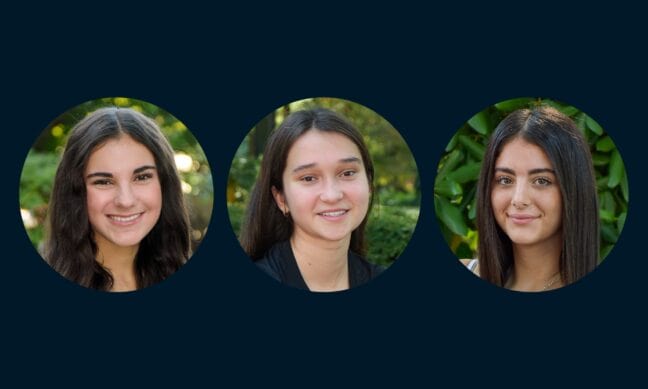Each year, The Alex Cohn Grant is awarded to Beaver students hoping to explore a particular interest in a way that will have a meaningful impact on their life journey. Inspired by a transformative semester Alex Cohn spent with a freestyle skiing team in Vermont, the grant emphasizes hands-on, experiential work that doesn’t fit into a normal school schedule.
Two unique projects were funded by the grant this year, enabling three students to leverage their passions to make impacts in and around the Beaver community. Leili Singer ’26 and Claire Truesdale ’26 used the grant to design and deliver sensory boards for children with sensory processing disorders. Each board was custom-made to reflect the interests and sensory needs of local children. Meanwhile, Maya Bitton ’25 took the grant as an opportunity to fund the development of adjustable baby clothing that could expand to fit growing toddlers, an initiative aimed at making baby clothing less expensive and more sustainable.
In the interviews below, each recipient details what they’ve accomplished, what they’ve learned, and what advice they’d give to other students.
Sensory boards – Leili Singer ’26 and Claire Truesdale ’26
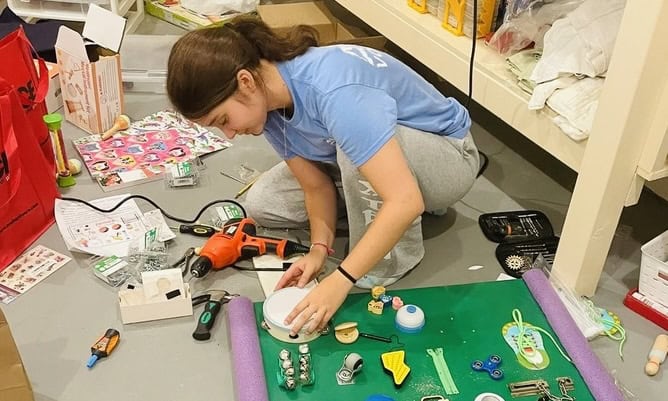
Where did the idea for your Cohn Grant project come from?
Leili: We knew we wanted to do something inclusion-oriented for our project because we both have been inspired by several experiences. For example, I worked last year with Beaver’s Joymakers Accelerator to build mini adaptable cars for kids with limited mobility.
Claire: Sensory boards have so much on them, so they offer a lot of different experiences. They are also a manageable size that we could create using the Cohn Grant funding.
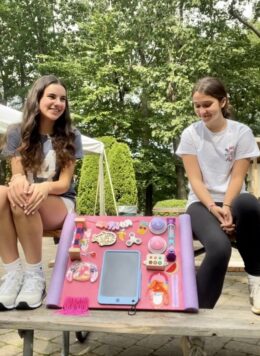
After receiving the grant, what were the first steps you took to start your work?
Leili: I will say, the application for the Cohn Grant really outlined everything that we had to do. By the time we submitted the application, we had a list of all the items we needed to purchase and a plan for how we would be using the grant. After receiving the grant, the next thing to do was find the kids that we would be building the boards for. We couldn’t start planning without the kids in mind.
What was one of the biggest challenges you had to overcome?
Claire: We ran into problems when it came time to start building the boards because we weren’t in the same location this summer. After ordering our supplies, Leili came down to visit me and we spent two days creating boards. It took a lot of planning and collaboration.
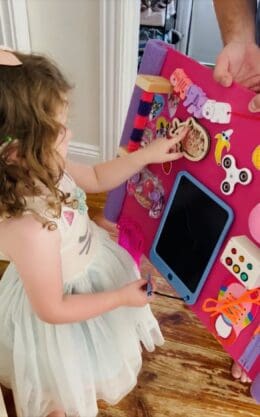
What was your favorite part of the entire process?
Leili: We expected that Avery (one of the recipients) was going to be there during the board drop off. We were really sad when she wasn’t. We didn’t even ask, but her mom ended up sending us an adorable video of Avery’s reaction to the board. I almost cried when I saw it. It was so heartwarming to see that what we spent our time doing really impacted somebody.
Claire: I dropped off four mini boards at an elementary school in Cape Cod and the kids were so excited. The teacher put a board down on a table and a little boy was so excited that he ran over and sat in the chair. The teacher told us that he had never done that before and that they usually have to lift him into the chair. It made me realize that we were helping these kids more than we even thought we were.
What advice would you give to someone that is considering applying for the Cohn Grant?
Claire: You might feel pressure to do something that you think is going to look amazing or that no one has ever heard of before. But in reality, the biggest thing is finding something that will teach you something. You can do something small and it can make a big difference.
Leili: I’d say choose something you are passionate about. This will be your entire summer, so your idea has to be something that genuinely interests you and speaks to who you are.
If you have an idea that you’re passionate about but you’re not sure if it would be accepted, go for it. You have no idea what could happen.
-Leili Singer ’26
Adaptable baby clothing – Maya Bitton ’25
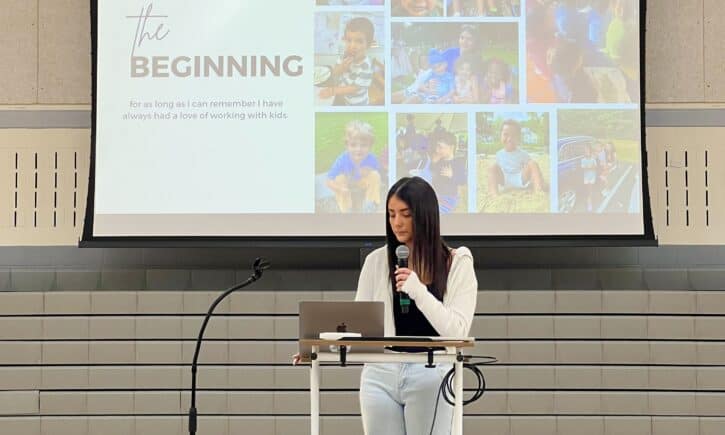
Where did the idea for your Cohn Grant project come from?
I was in my costume design class and we had an open project where we could design anything. At the same time, I was volunteering at the Pine Manor preschool and exploring social action and civic engagement with the Hiatt Center. So I was like “what’s something that would combine these three things that I’m spending most of my time doing?” So I started designing this idea with Ms. Eddy in class.
How did you transition from working on this project in a classroom setting to working on independently with the Cohn Grant funding?
I first focused on finishing up the prototype I started in class. My idea changed a couple of times throughout this process. At first, I wanted to create a prototype and then hand sew 15 to 20 adjustable items to donate. I finished the prototype faster than I expected and realized I still had six months to complete the project. I decided to push it one step further and actually try to get it manufactured. Part of that was getting a patent, which I had no idea about.
What was your favorite part of this entire process?
People’s reaction to the idea. After awhile, I was living and breathing this idea; I woke up thinking about it and went to sleep thinking about it. When you work on something for so long, it’s hard to see it from another perspective. I remember I was having a conversation with Ms. Hanig and was telling her about this idea. She couldn’t believe how cool it was. I was shocked at her response, because I had never even considered that other people would think the idea was cool too.
The Cohn Grant has allowed me to turn a dream into a reality
-Maya Bitton ’25
What was one of the biggest challenges you had to overcome?
The manufacturing piece of it. I’m not done with this project, because manufacturing takes a long time and a lot is out of my control. So it’s kind of a waiting game. But I feel like it’s valuable to have to wait and sit with your ideas. It’s allowed me to focus on other aspects of the product like marketing, my mission statement, and any target audiences.
What advice would you give to someone that is considering applying for the Cohn Grant?
Just shoot your shot. If you have an idea you are passionate about, just go for it. It doesn’t matter where in the process you are for the project as long as you care about what you’re doing. I started this idea on the back of my math homework, so if you’re just in the beginning part of an idea like that, you can still do it and end up making a difference.

